Periodontal disease, commonly known as gum disease, is a prevalent oral health condition that can range from mild gingivitis to severe periodontitis. While prevention is essential in maintaining healthy gums, there are instances when periodontal disease treatment becomes mandatory. In this article, we will explore the circumstances that make treatment necessary and the importance of timely intervention to preserve oral health.
Progression of Gum Disease
Understanding the progression of gum disease is crucial in determining when treatment is mandatory:
– Gingivitis: Gingivitis is the earliest stage of gum disease, characterized by gum inflammation, redness, and bleeding during brushing and flossing. At this stage, gum disease is reversible with proper oral hygiene and professional cleaning.
– Early to Moderate Periodontitis: As gum disease progresses, it can advance to the early and moderate stages of periodontitis. Symptoms include gum recession, pockets forming between teeth and gums, and potential tooth mobility. Treatment is vital to halt further damage and prevent tooth loss.
– Advanced Periodontitis: In advanced periodontitis, severe gum and bone damage occur. Teeth may become loose, and significant tissue and bone loss is evident. Treatment is imperative at this stage to prevent tooth loss and maintain oral health.
Pain and Discomfort
Gum disease can lead to various painful symptoms, making treatment mandatory:
– Chronic Gum Pain: Persistent gum pain or discomfort is a clear indication that treatment is required. Pain can range from mild to severe and may be accompanied by swelling and redness.
– Tooth Sensitivity: As gum disease progresses, it can cause tooth sensitivity to hot or cold temperatures. This sensitivity can become painful and disrupt daily life.
– Difficulty Chewing: Individuals with advanced gum disease may experience difficulty chewing due to loose or shifting teeth. This can lead to malnutrition and further oral health issues.
Aesthetic Concerns
Aesthetic concerns can also necessitate periodontal disease treatment in Coweta OK and all other regions:
– Gum Recession: Gum recession, which often occurs with periodontal disease, can result in exposed tooth roots. This not only affects the appearance of the smile but can also lead to tooth sensitivity.
– Bad Breath: Persistent bad breath (halitosis) is a common symptom of gum disease. It can be socially distressing and significantly impact one’s quality of life.
Medical and Systemic Implications
Gum disease is associated with systemic health issues, making treatment mandatory to address potential risks:
– Heart Health: Research has linked gum disease to an increased risk of cardiovascular diseases. Treating gum disease may reduce this risk.
– Diabetes Management: Individuals with diabetes are more prone to gum disease. Managing gum disease can positively influence glycemic control.
– Pregnancy Complications: Pregnant individuals with gum disease may be at risk of adverse pregnancy outcomes. Timely treatment is vital to reduce these risks.
Conclusion
Periodontal disease treatment becomes mandatory in various situations, including disease progression, pain and discomfort, aesthetic concerns, and potential systemic health implications. Gum disease is a common and treatable condition, but timely intervention is crucial to prevent irreversible damage, maintain oral health, and reduce associated health risks. If you suspect gum disease or are experiencing any symptoms, it’s essential to seek professional dental care promptly to determine the appropriate treatment plan and preserve your overall well-being.

